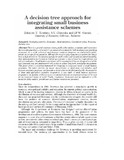A decision tree approach for integrating small business assistance schemes

View/
Date
2004Author
Temtime, Z.T.
Chinyoka, S.V.
Shunda, J.P.W.
Publisher
Emerald Group Publications, www.emeraldinsight.comType
Published ArticleMetadata
Show full item recordAbstract
There is a general consensus among public policy makers, academics and researchers that entrepreneurship is a vital route to economic advancement for both developed and developing economies. As a result, a host of small business assistance programs are conducted by public, private and nonprofit organizations. Although the need for intergrating these programs has always been a high priority on the national agenda for public policy and research in entrepreneurship, their implementation particularly in developing economies is characterized by fragmentation and lack of coordination. Small business assistance will be meaningful if they are designed in a holistic and systematic way and implemented with a view to achieve long term sustainable development. This paper offers a conceptual framework for designing an integrated model of small business assistance. The paper identifies the major characteristics of small firms and potential small business assistance programs, and presents a decision tree model that matches the characteristics of firms with appropriate assistance program(s). A case study of small business assistance programs in the Republic of Botswana was conducted to provide an empirical evidence of the need for an integrated design or model. Finally, conclusions, discussions and the implications of the model for policy makers, practitioners and further research are presented.
